Hong Kong News

‘Not in my backyard’: China’s controversial new embassy in London
At the heart of London’s East End, painted on the side of a former Tower Hamlets town hall, is a 12-metre-high depiction of a violent struggle – scenes of fists, police truncheons, interspersed with contorted, angry, defiant faces, black and white cheek by jowl, manning barricades. Mid-wall, Adolf Hitler is being swept away by the jeering crowd, to be duly exited from the scene far right.
The Battle of Cable Street mural retells how on October 4, 1936, London’s East Enders mustered a 30,000-strong ethnically and politically diverse crowd – Jews, Irish dockers, trade unionists, migrants, the English working class – to oppose a march by the British Union of Fascists led by Oswald Mosley and his blackshirts, goose-stepping with a raised armed salute like their German and Italian counterparts.
To the left of the mural, a banner is festooned with the slogan “Mosley shall not pass – bar the road to British Fascism”.
This epic street battle has for decades encapsulated the East Enders’ legendary character, the “Blitz spirit” that saw them through nightly Nazi bombing raids during World War II.
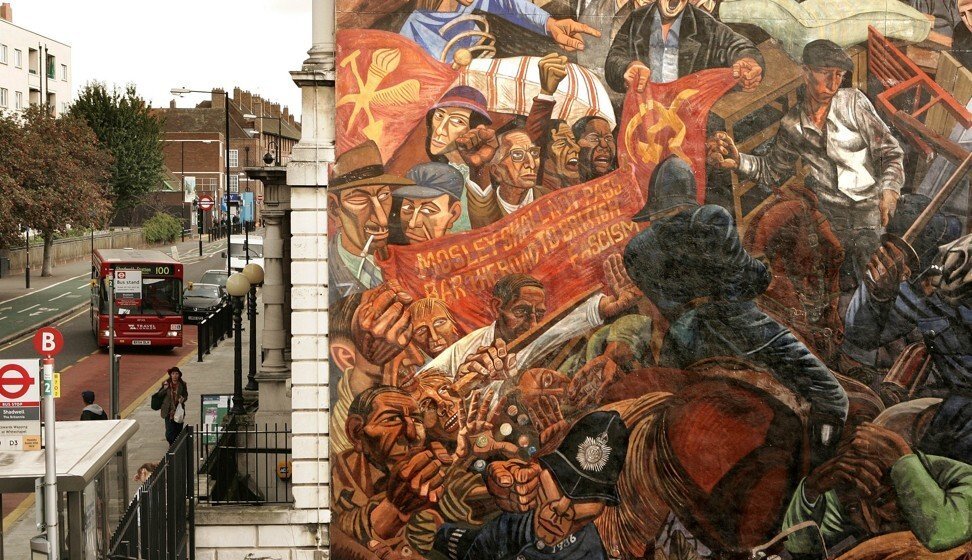
Now the current residents are making like their forebears and mobilising once more to confront what they believe to be a new threat to their streets – China’s new embassy and the imminent arrival of the Chinese Communist Party.
Local councillor Rabina Khan represents some of the Muslims who make up 38 per cent of the people living in this iconic London borough. She is helping to organise resistance to Beijing’s treatment of fellow Muslims and other alleged human rights abuses.
“This space is perfect for protesters to camp out on,” says the Liberal Democrat politician, surveying the paved area outside the imposing gates of Royal Mint Court, the site Beijing bought 2½ years ago for £225 million (US$300.61 million) and plans to redevelop into its biggest overseas diplomatic mission. “We’ll get more people protesting here than at the existing Chinese embassy.”
China spent years seeking a new site for its British diplomatic mission, “showing great patience”, according to the property company that flagged up the iconic old mint as a possibility. At the time, the purchase was seen by many as a coup for China, not only for the Royal Mint’s prime location, but for the fact that much of the profit made from the opium trade that led to China’s “century of humiliation” was processed and recycled there, to bolster the empire and shape the first-world economy Britain remains today.
The grand Georgian building, built in 1809, comes equipped with a formidable perimeter wall and is located next door to the symbolic beating heart of Great Britain – the crown jewels, kept safe in the Tower of London; the site is also a penny’s throw away from Europe’s and Britain’s financial hub, the City.
Neither Beijing nor the British blue-chip property agents hired to oversee the move – and to navigate Britain’s notoriously complex planning laws – expected their welcoming committee to consist solely of protesters. Two years, though, is a long time in geopolitics. Where once Chinese investment was keenly welcomed, it is now viewed as a threat to British values and should, unless under certain conditions, be met with formidable resistance.
“If the Chinese Communist Party fails to stop their persecution of Uygur Muslims, Tibetans and the people of Hong Kong,” says Tower Hamlets councillor and resident, Conservative Peter Golds, “they may find there will be a traditional East End welcome for them when they do move in.”
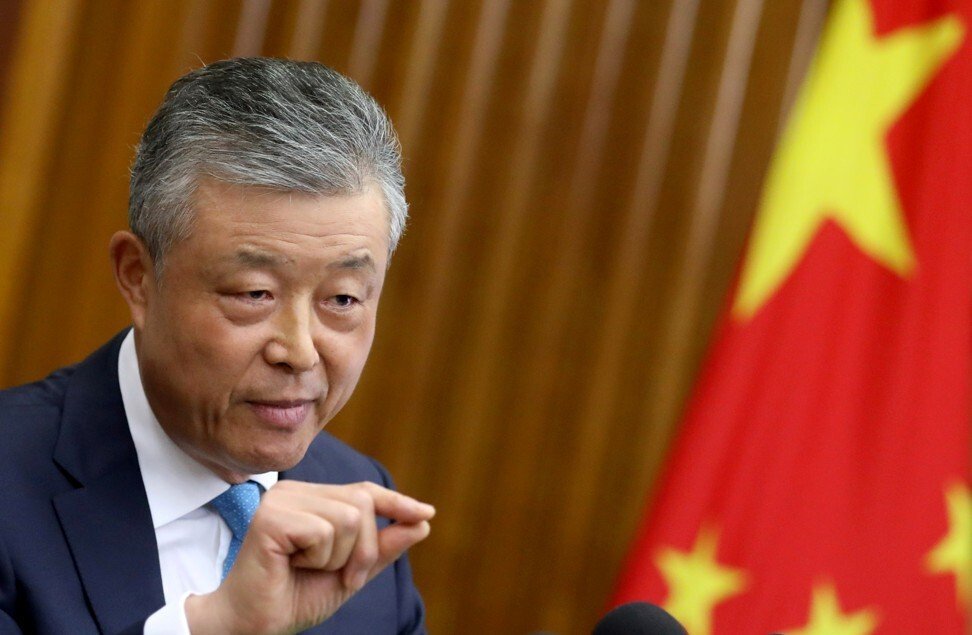
Back in May 2018, when the Chinese government took ownership of the vacant Royal Court Mint, there was a warm reception by the official welcoming committee, Tower Hamlets Council leaders, who with proverbial outstretched arms embraced the Chinese vote of confidence in a borough blighted by impoverishment.
Tower Hamlets Council is the local planning authority that will examine the Chinese redevelopment plans, which include an ambassador’s residence, a visa office, a cultural centre and apartments for the expected 300 extra diplomats.
Flanked by the leader of Tower Hamlets, Mayor John Biggs, and other dignitaries gathered inside the gates, China’s ambassador to Britain, Liu Xiaoming
, declared “an embassy is the face of a country” and expressed his confidence that China’s “will become a new landmark in London”.
“The River Thames is not far from here and has quietly flowed for centuries, giving birth to the British civilisation and adding splendour to the ‘crown jewels’ of world civilisations,” he said. “The Thames today is bearing witness to the historic moment of the transfer of the new diplomatic premises of the Chinese embassy in the UK. It is a new face of China in the new era, to write a new chapter for a China-UK golden era.”
For Tower Hamlets Council, the sale was a welcome boost to its threadbare coffers and would put an end to the constant sleights from campaigners demanding more affordable homes be built on the long vacant site, which in the past had been occupied by squatters.
Mayor Biggs said the Chinese embassy was “a vote of confidence” in the borough as an “open and dynamic place to live and work”.
On that day of exchanging contracts, applause rippled around the courtyard and Liu and Biggs beamed for the cameras. The photos headlined in the next day’s local newspaper and media websites.
But the once warm breeze that blew up the River Thames from the East has turned frigid. A slew of policies and events – new laws in Hong Kong, oppression in Xinjiang, the banning of Huawei from Britain’s 5G infrastructure due to security concerns, let alone questions over China’s Covid-19 pandemic transparency – have tarnished the once lauded “golden-era” of Sino-British relations; the October 2020 Pew Research Centre’s “global attitudes and trends” survey found that in Britain, about three-quarters of the population now see China in a negative light.
Golds, Khan and other councillors have written letters to the Chinese embassy protesting the claimed oppression, and are working to pass an emergency motion titled “regarding the treatment of Uygur Muslims in China and the situation in Hong Kong”.
Under mounting pressure from opposition councillors and residents, Biggs, a Labour councillor, recently wrote to Liu calling on Beijing to respect the concerns of local citizens over human rights abuses in Xinjiang, Hong Kong and Tibet, and to implement immediately international human rights laws.
“I am deeply troubled by reports which suggest there are human rights violations against the Uygurs,” wrote Biggs, “in particular the reports of arbitrary detention, widespread surveillance, restrictions of cultural and religious freedoms, and even shocking reports about forced labour, sterilisation and birth control. Tower Hamlets has a long and proud history of celebrating our diversity and standing together as one, and the reports about the situation in Xinjiang are of huge concern to our diverse borough, which of course includes a large number of Muslim residents, in light of your Government’s plan to move its embassy in the UK to Tower Hamlets […]
“Given our country’s history and the fact that our borough is home to many people from China and Hong Kong, we feel we have a duty to raise our concerns on this matter too.”
He urged the Chinese government to uphold its international obligations and commitments to respect human rights, and said a cross-party motion calling out Beijing would be debated.
Liu returned a taught riposte, which has been leaked to Post Magazine, telling him in no uncertain terms to butt out of China’s internal affairs and to rein in his protesting residents and council members. Liu told Biggs that he would dispatch an envoy to educate the council leaders on China’s policies in Hong Kong and Xinjiang, and signed off by saying locals should not seek to disrupt the new Chinese embassy development, noting that the British embassy in Beijing is also seeking redevelopment permission.
The Wolf Warrior’s retort drew parallels to that made by China’s ambassador to Canada, Cong Peiwu, who in October threatened Hong Kong-based Canadians if Ottawa offered asylum to protesters from the city and, more recently, the threat to Australia made by a Chinese government official in a briefing with a reporter in Canberra. “If you make China the enemy, China will be the enemy,” he said.
Liu’s rebuttal to a London borough mayor has further angered Tower Hamlets officials who, on being passed the letter, retorted that they, like their forebears, would not be cowed by thinly veiled threats and blackmail, and would stand firm on their demands.
“The Chinese are a great civilisation and the Chinese Communist Party now a great power. What Beijing must realise is that with that power comes responsibility,” said Councillor Golds, flanked by Councillor Khan. “And if the people of Tower Hamlets don’t like what the Chinese government is doing, they will enact their democratic right to come and protest outside the new embassy and freely let it be known that we will not be moved while the Uygurs and others are being persecuted.”
The councillors also received letters from the Chinese embassy, claiming the media and activists were whipping up anti-China sentiment, and denying human rights abuses in Xinjiang.
“Not once in the letters sent to us did the Chinese mention the word ‘Uygurs’. It’s as though they have been airbrushed out of the narrative,” said Khan.
The councillors now vow they will make it known 21st century fascism will not be hosted in their backyard. Their motion will be re-tabled next month along with other proposals to mark China’s arrival in the neighbourhood. And protests are planned – a forewarning to Beijing about what to expect if and when the Chinese flag is planted on East End soil.
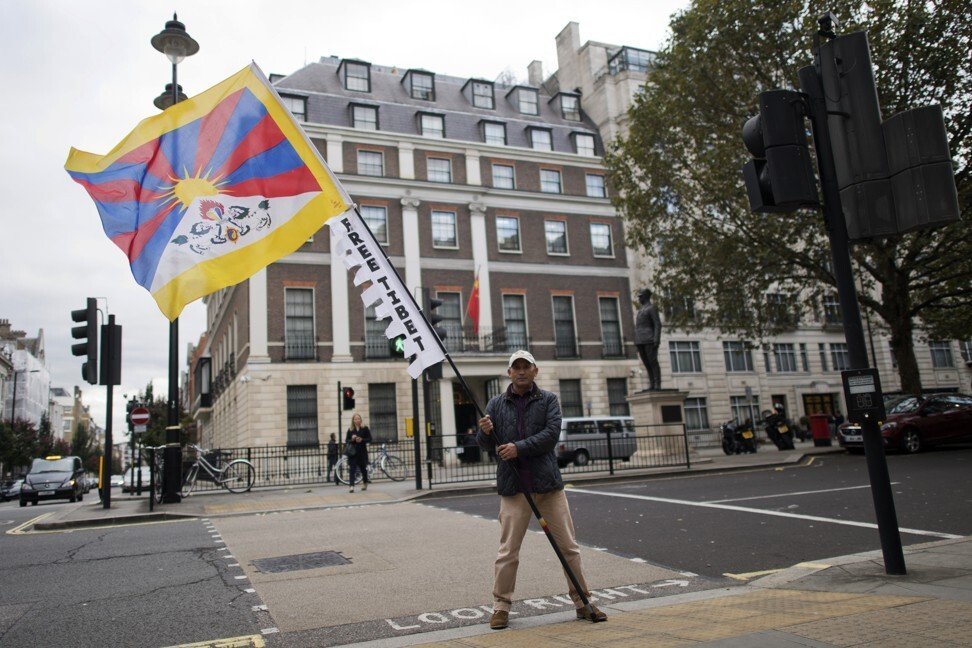
Few would deny that China has outgrown its current embassy building, in Portland Place, owned and occupied since 1973. It is more akin to a large upmarket town house and better suited to, say, a middling-sized power such as Israel or South Korea, or perhaps a Russian oligarch.
Beijing’s desire to upsize has as much to do with prestige and power projection as with the desperate need for extra operational space for existing staff and a planned increase in diplomats. Most of the estimated current 115-plus personnel are forced to work in cramped offices, and many are believed to live on the 65,000 square metre site, or close by in converted mews houses, sleeping in triple bunk-bedded rooms – accommodation that resembles a Chinese university’s halls of residence.
Privacy is a rare luxury. The embassy doors open right out onto the street. Protesters get so close with their grievances that it must often feel to those inside they are picketing on the window sills.
Diplomats within know when the elusive English summer has arrived not only by the visiting African swallows but also by the international attendees of the annual June 4 Tiananmen Square crackdown remembrance, the white wax from their candles dripping across the embassy’s doorstep and congealing in gutter slats, an unintended nod to the well-documented spilling of blood in 1989.
Free Tibet activists are regular protesters, too, and, of late, angrier types denouncing the “gulags” in Xinjiang and the national security law in Hong Kong have been showing up to exercise their democratic right to peaceful assembly; sometimes at night they project incandescent freedom slogans and chilling accusations of genocide onto the five-storey facade in social media-sharing stunts.
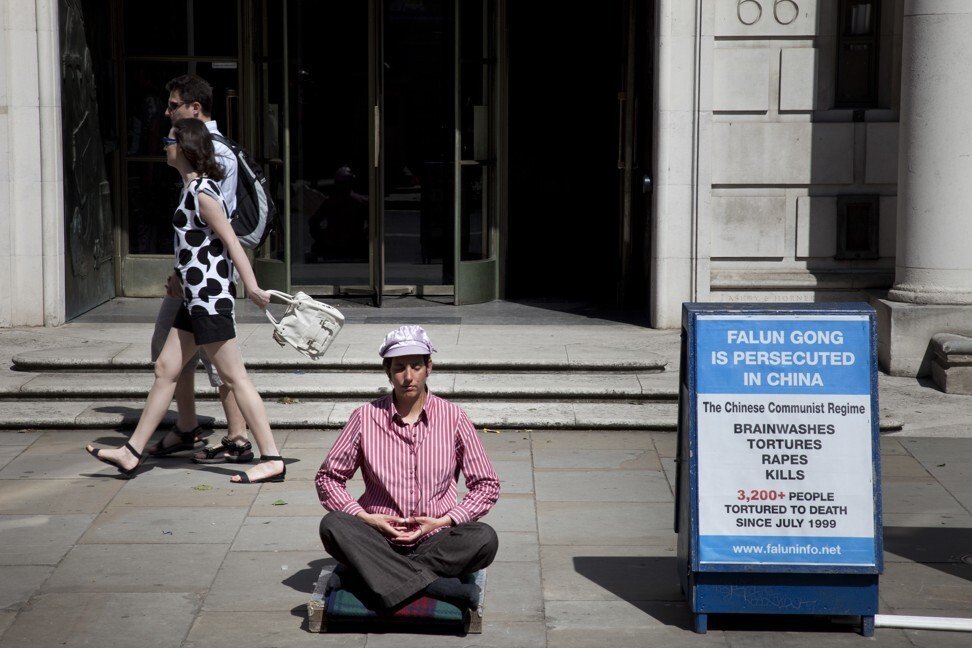
Every day, rain or shine, a lone Falun Gong protester sits crossed-legged in silence surrounded by gruesome photos of organ-removal surgery, demanding China stops its persecution of believers.
Councillor Khan was among the 100-plus people outside the Portland Place embassy on October 1, China’s National Day, loudly protesting, waving placards and giving speeches through loud hailers. The embassy’s bombproof net curtains might shut out prying eyes but they do allow embassy staff to observe the street stealthily, and no doubt on that day many within watched with dismay as militant protesters burned the Chinese flag under their nose.
In a statement, Liu said, “In blatant, flagrant and abominable acts of vandalising and insult in front of the Chinese embassy in the UK, a dozen ‘Hong Kong independence’ rioters set fire to the national flag of China, assaulted the main gate of the embassy building and put up ‘Hong Kong independence’ slogans on the gate.”
Beijing expressed “strong indignation and condemnation” of the “despicable acts”. But British politicians, among them Foreign Secretary Dominic Raab, argued that the people of Britain have the right to demonstrate their views, their fire and their fury, so long as they do so without committing crimes, or endangering or threaten life.
A British government spokesman later said, “People in the UK have the right to gather together and to demonstrate their views, provided that they do so within the law.”
Indeed, whenever Chinese diplomats have complained to Britain’s diplomatic police force that the protesters are too close, too noisy and too insulting, so hurting the feelings of the Chinese people, they have been told that since no law has been broken, there is nothing that can be done.
Lately, two private security guards have been spotted outside the embassy’s doors, giving the entrance porch the look of a Soho nightclub.
For embassy staff, relocation to new, modern, spacious diplomatic quarters protected from demonstrations by an impregnable six-metre-high outer brick wall and formidable gates – a fortress to rival the central government’s residential compound, Zhongnanhai, in Beijing – could come soon enough.
When China bought Britain’s former money-printing site, “the Chinese believed they would enjoy some kind of diplomatic immunity from Boris [Johnson, Britain’s prime minister] and fast-track through planning”, says a planning insider with knowledge of the project.
At the time, it was expected doors would open by May this year, but favours called in by Beijing from the once enthusiastic British political and business establishment to smooth over complicated deals, including those involving the country’s notorious planning rules, are falling on deaf ears, as many seek to distance themselves from headlines about Xinjiang gulags and brutal police oppression in Hong Kong.
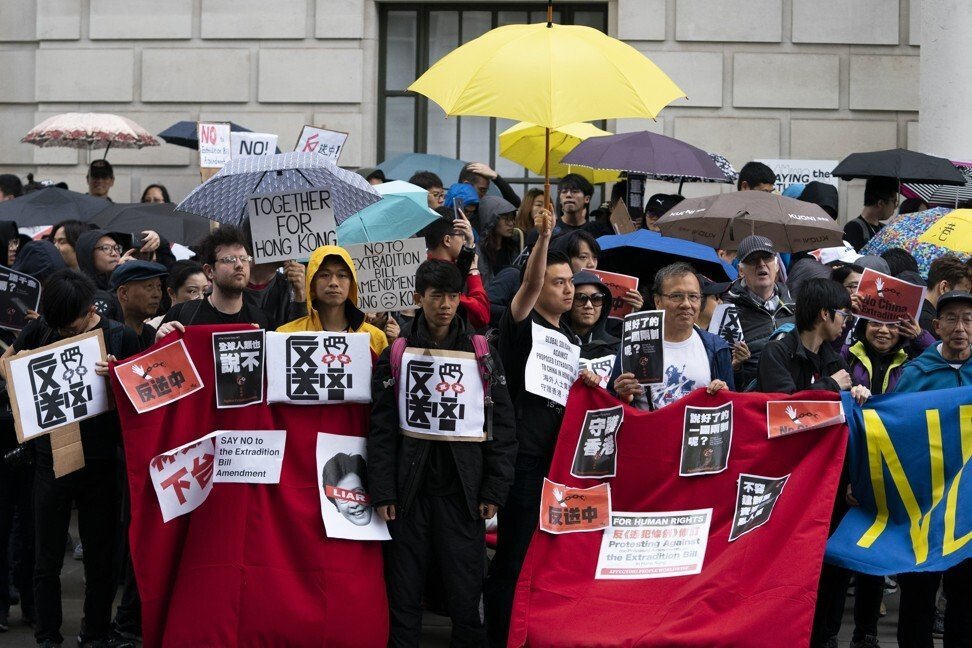
Last spring, China dispatched with the services of CBRE, the property company it used to find the site, and hired planning consultants, DP9. According to its website, the firm “provides specialist expertise and advice on planning strategies, the preparation of planning application submissions and negotiations throughout the entire approvals process”.
It boasts an impressive portfolio, and was behind many of London’s modern skyscrapers, as well as the United States’ new British embassy. In 2007, the Evening Standard newspaper counted DP9 senior partner Malcolm Kerr among London’s top influencers, describing him as a “Svengali to the London skyline, pushing almost every major planning application including the Helter Skelter, the Walkie Talkie, Smithfield and Barts. A Mr Fixit for developers who keeps a very low profile”.
A Tower Hamlets Council spokesman confirmed that since July “the Chinese embassy has only been holding informal discussions with our planning team”, which is one of the earliest stages of the planning process. “I can confirm they’ve entered formal pre-application discussions, which is a paid-for service.”
Pre-application discussions are being held between developers, public-sector agencies and communities “to help shape better quality, more accepted schemes […] and deliver improved outcomes for the community […] these discussions also avoid wasted effort and costs”.
The Chinese embassy responded to a request for an update on its new embassy planning via its PR agent, hired in August, London Communications. A spokesman confirmed that “the planning application for the new embassy has not been submitted yet,” and “the proposals for the Royal Mint Court site are still at an early stage. We will provide a further update at a later stage”.
He also said current diplomatic tensions between London and Beijing should not affect the planned move: “It is right and proper that every country should have ambassadorial representation as continued and effective dialogue between nations is essential.”
As part of a community engagement programme, Chinese diplomats plan to meet “with local residents to answer any questions they may have”.
The statutory planning application consultation with the public began this month, with residents sent a letter and plans from Yuzi Xia, minister counsellor of the Chinese embassy in Britain.
“Given the impact of the coronavirus pandemic, and the recently announced second lockdown, we are unfortunately unable to hold any public exhibitions on the proposals. However, we hope this information and the images we have enclosed better illustrate our thinking and we would very much welcome any questions or comments at this stage,” he wrote.
Councillors were quick to caution the Chinese that any belief the pandemic could be used to sweep through the process was mistaken. “I’ve already received complaints from residents about the letter. We’ll be scrutinising the planning process every inch of the way,” said Khan.
During November’s full council meeting, Khan called for the letter exchange between Biggs and Liu to be made public because she and others feared their council leader had been cowered by China’s reply.
As seen, the last paragraph of Liu’s letter highlights the British government’s request for permission to redevelop its embassy in Beijing, plans confirmed by a British Foreign Office spokesperson.
“At the moment, both our countries are promoting the construction projects of our respective embassies,” wrote Liu. “It is hoped that Tower Hamlets Council will respect the agreement reached between the Chinese and UK governments, resist disruptions and foster sound conditions for the building of the new embassies in our respective capitals.”
His words have been construed by some as a warning to the protesters to “shut up and put up” with the new Chinese embassy, but “if they think we will be frightened into silence,” says Khan, “the CCP has clearly not done its homework about the values held by the people of Tower Hamlets and how determined we are to hold them”.
Local resident and London mayoral candidate Farah London, who lives on Royal Mint Street, is calling on the capital’s current mayor, Sadiq Khan, “to call out this oppression and abuse of human rights, and exert pressure on the Chinese government. Tower Hamlets has the highest proportion of Muslim residents of any borough in the country [according to the latest census]. Having the embassy of a government determined to suppress your beliefs and culture will be deeply upsetting for not only the Muslim community, but all Londoners who value freedom”.
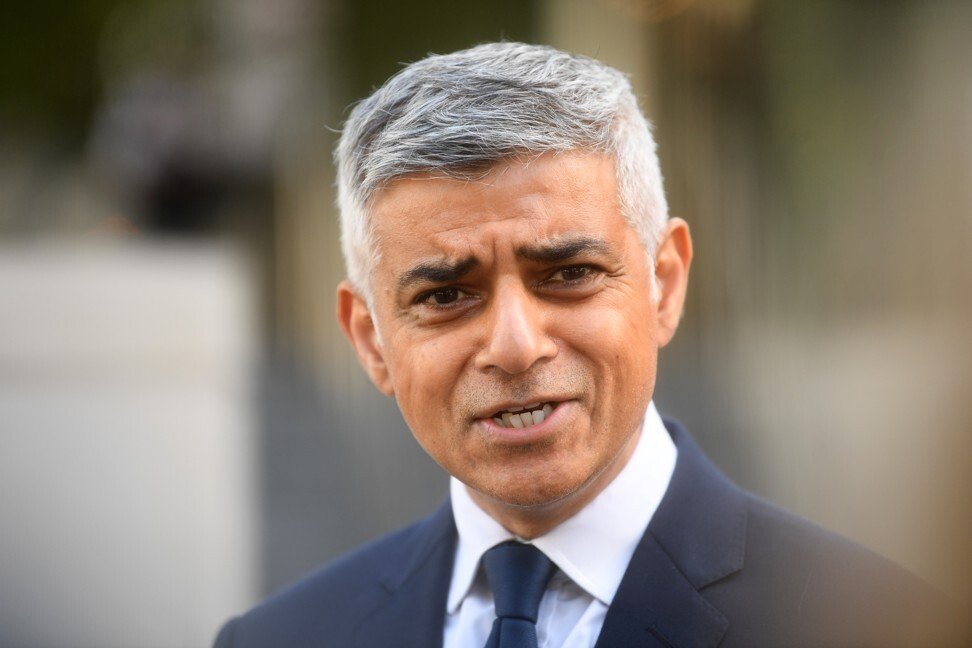
Some locals plan to begin staging protests outside the new embassy once the current Covid-19 lockdown eases on December 2, to show what is in store once the Chinese move in.
Human rights charity Restless Beings has its headquarters in Tower Hamlets, and co-founder Mabrur Ahmed says that while the group “absolutely recognise the freedom that China must have over its decision to move its embassy, we do bring into questioning the decision to select a building which with its fortress-like walls seems to be motivated by keeping out protesting voices of the general public”.
Intervention by the British government was dismissed by a Foreign Office spokesperson, who said the “construction at Royal Mint Court is a matter for Tower Hamlets Council to comment on”.
The eyes of China’s new London neighbours are now on the next full Tower Hamlets council meeting in January, when Biggs will, as he informed Liu in his letter, “be discussing the matter in more detail […] and I hope agreeing a cross-party motion on the matter”.
Councillors, taking inspiration from the nearby Battle of Cable Street mural, will also make several proposals to surround the new embassy “with reminders”. A small unnamed road adjoining the new Chinese embassy might, if agreed, be called Tiananmen Street, or Taipei Road, a residential area renamed Uygur Court, and other sites named for Hong Kong and Tibet – symbolic gestures to show support for people who have challenged Beijing, says Councillor Andrew Wood.
“It might be just one way of sending a message that governments have to look after all their people,” he said.











